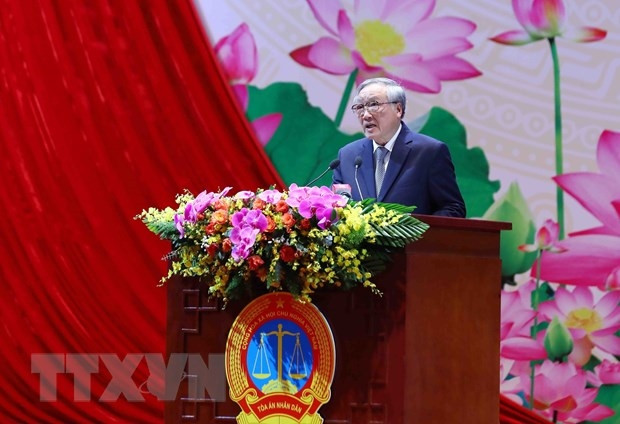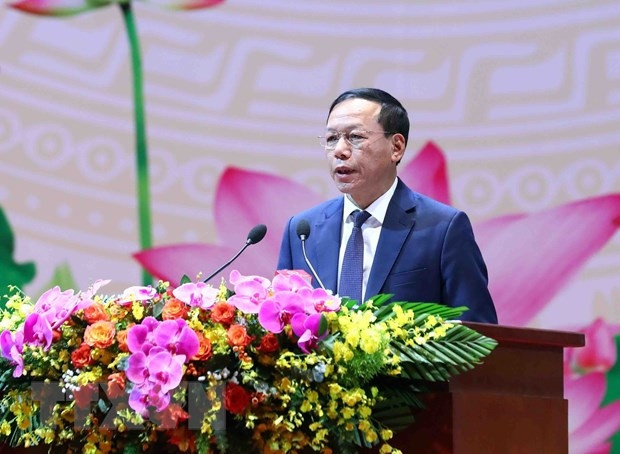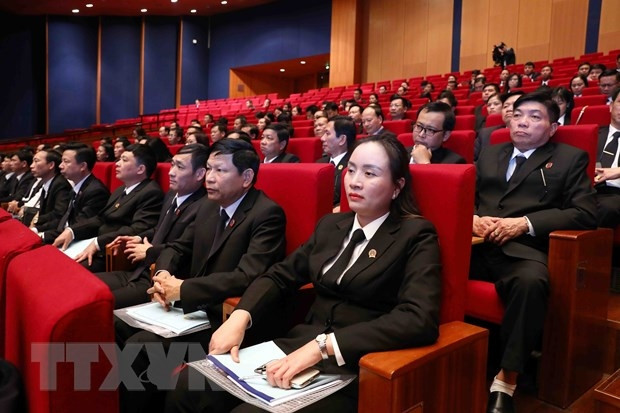Chief Justice of the Supreme People's Court Nguyen Hoa Binh assessed that courts at all levels have proactively and creatively proposed many breakthrough solutions to reform the judiciary and improve the quality of court operations.

Comrade Nguyen Hoa Binh, Politburo member, Secretary of the Party Central Committee, Chief Justice of the Supreme People's Court, speaks. (Photo: Pham Kien/VNA)
On February 26, the Supreme People's Court held a conference to deploy judicial reform work in accordance with Resolution No. 27-NQ/TW dated November 9, 2022 of the Central Executive Committee. Politburo member, Secretary of the Party Central Committee, Chief Justice of the Supreme People's Court Nguyen Hoa Binh chaired the conference.
6 directions for amending the Law on Organization of People's Courts
Reporting at the Conference, Permanent Deputy Chief Justice of the Supreme People's Court Nguyen Tri Tue said that the Party's major policies and guidelines on judicial reform, on innovation in the organization and operation of the Court have set many new requirements and tasks for the Court. In particular, Resolution No. 27-NQ/TW has set out the task: "Promoting judicial reform, ensuring the independence of the Court according to its jurisdiction, independent Judges and Jurors and only obeying the law."
According to the report at the conference, after 8 years of implementation of the Law on Organization of People's Courts, the Court system has been improved and developed in both organization and operation. The team of judges, officials and civil servants of the Court has been consolidated and enhanced in both quantity and quality. The quality of trial and settlement of cases has been ensured, the rate of judgments and decisions being annulled or amended due to subjective errors of judges has been decreasing, meeting the targets and requirements of the National Assembly.
The work of law-making, summarizing the trial practices of the courts, ensuring the consistent application of the law in trials has been carried out effectively, creating conditions for courts at all levels to better perform their tasks. The material facilities of the courts have been significantly improved, contributing to maintaining political stability, social order and safety, and increasingly meeting the political requirements and tasks set for the work of the courts.
However, the practical implementation of the Law on Organization of People's Courts 2014 shows that there are still limitations and shortcomings. Specifically, the perception of the position and role of the court as "the adjudicating agency, exercising judicial power" is not really appropriate and unified, leading to the incomplete determination of the tasks and powers of the court.
In addition, the functions, tasks and composition of the National Council for Selection and Supervision of Judges are not really suitable, affecting the effectiveness of its operations; there is no effective mechanism to protect judges. The mechanism for allocating and approving the budget for the courts is still inadequate.
Deputy Chief Justice Nguyen Tri Tue assessed that the above-mentioned difficulties and shortcomings in the organization and operation of the court have affected the construction of a professional and modern court; it is necessary to study, amend and supplement according to the judicial reform policy, ensuring the independence of the court, meeting the development requirements of the country in the new period, catching up with progressive judicial systems in the world.

Deputy Chief Justice of the Supreme People's Court Nguyen Tri Tue speaks. (Photo: Pham Kien/VNA)
Based on the above reality and to institutionalize the Party's major guidelines and policies on judicial reform, on innovation in the organization and operation of the court, the Supreme People's Court has proposed 6 orientations in the proposal to develop a Law amending and supplementing a number of articles of the Law on Organization of People's Courts.
The orientations include: Completing regulations on the position, functions, tasks, powers and principles of organization and operation of the court; Completing regulations on the organization of the People's Court; amending and supplementing the name, functions, tasks and composition of the National Council for Selection and Supervision of Judges; completing regulations on judicial positions in the People's Court; ensuring resources to build modern courts that operate effectively and efficiently; innovating and perfecting the mechanism for people to participate in trials at the court.
The position and prestige of the Court are increasingly enhanced.
Speaking at the conference, Chief Justice of the Supreme People's Court Nguyen Hoa Binh assessed that courts at all levels have proactively and creatively proposed many breakthrough solutions to reform the judiciary, improve the quality of court operations in general and improve the quality of trial work in particular.
Many major policies and tasks on judicial reform have been proposed by the courts to be institutionalized in the Constitution and laws and have been seriously and synchronously implemented. The functions, tasks, and organizational structure of the court system have been strengthened and strongly innovated; the contingent of cadres and civil servants, especially those holding judicial positions, has been strengthened in both quantity and quality; the quality of trial work of courts at all levels has achieved many outstanding achievements, contributing to maintaining political security and social order and safety.
The position and prestige of the court are increasingly enhanced. However, Chief Justice Nguyen Hoa Binh also said that, in addition to the achieved results, the quality of trial work of the Courts at all levels still has some limitations and shortcomings; the organization and operation of the court still have issues that need to be further studied and improved in the coming time.
Resolution No. 27-NQ/TW dated November 9, 2022 of the Party Central Committee has set out one of the key tasks: "Building a professional, modern, fair, strict, honest judiciary, serving the Fatherland, serving the people, protecting justice, protecting human rights, citizens' rights, protecting the socialist regime, protecting the interests of the State, the legitimate and legal rights and interests of organizations and individuals... Promoting judicial reform, ensuring the independence of the Court according to its jurisdiction, Judges and Jurors adjudicating independently and only obeying the law"...
Therefore, the conference on implementing judicial reform in the spirit of Resolution No. 27-NQ/TW is of utmost importance. The conference program devoted most of its time to evaluating the results of implementing solutions to improve trial quality in the recent past, and discussing and approving solutions to continue improving trial quality in the coming time.

Delegates attending the conference. (Photo: Pham Kien/VNA)
The conference discussed and agreed on major orientations to promote judicial reform, perfect the legal system, law enforcement mechanism, build a professional, modern, fair, strict, honest, serving-the-country, and serving-the-people judiciary.
“Based on the comments and discussions of the delegates at the conference, the Party Committee and the Supreme People's Court leadership will study, absorb and supplement solutions to improve the quality of trials; complete the dossier of the Law on the Organization of People's Courts and submit it to competent authorities for consideration, creating a strong change in the entire Court system, effectively performing its functions and tasks as required by the Party, State and people,” Chief Justice Nguyen Hoa Binh emphasized.
Also at the conference, the representative of the Central Internal Affairs Committee introduced to all delegates the content of the book "Resolutely and persistently fighting against corruption and negativity, contributing to building our Party and State increasingly clean and strong" by General Secretary Nguyen Phu Trong, Head of the Central Steering Committee on preventing and combating corruption and negativity.
This is a book with a large amount of knowledge, summarizing the theory and practice of our Party's fight against corruption and negativity. The thorough understanding and implementation of the book's contents are extremely important in the context of the fight against corruption and negativity in Vietnam being directed by our Party vigorously, resolutely, uncompromisingly and has achieved comprehensive and positive results.
According to VNA